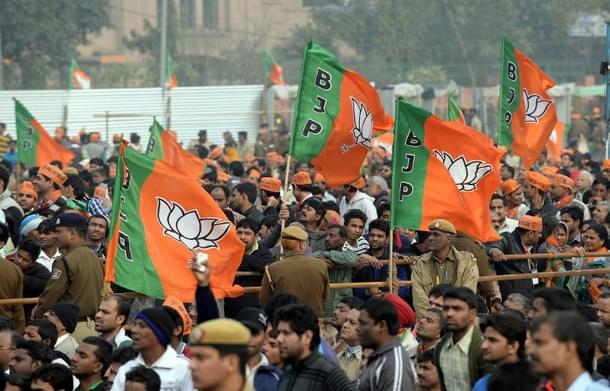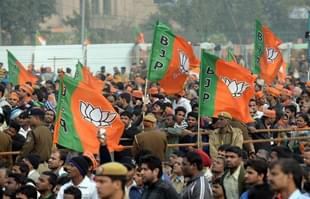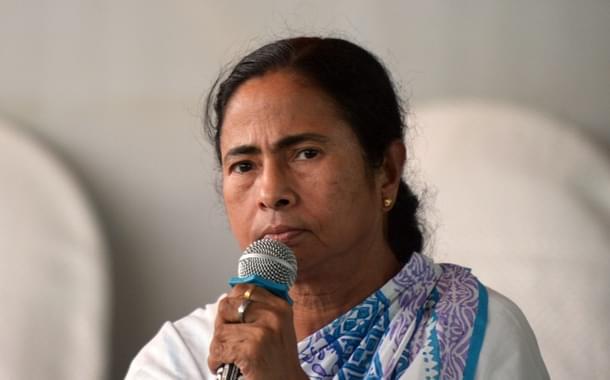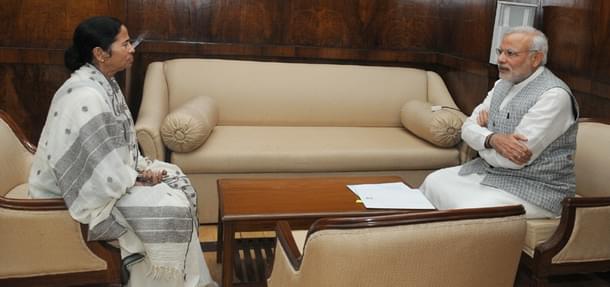Politics
BJP Sacrificing Bengal For Rajya Sabha
Jayant Chowdhury
May 20, 2015, 07:19 PM | Updated Feb 11, 2016, 09:40 AM IST
Save & read from anywhere!
Bookmark stories for easy access on any device or the Swarajya app.


The national party needs TMC’s support for passage of crucial Bills in the Upper House and the regional party wants the CBI probe into Saradha scam stalled.
Just a year ago, the BJP appeared to be on a roll in West Bengal, emerging as a serious contender for power. The aggressive posturing by top BJP leaders, including Narendra Modi, against the ‘corrupt’ and ‘inept’ Trinamool Congress government in the state, was being well received by Bengal’s electorate. Along with the Modi magic, what struck a chord among many in the state was that the BJP, with its promise of clean governance and a strong agenda for development, was a viable alternative to not only the Trinamool but also the Left (which had ‘ruined’ Bengal) and the Congress which has nothing much to show for itself in Bengal anyway. The results of the Lok Sabha polls last year showed that the BJP could pose a serious challenge to Mamata Banerjee in the 2016 Assembly polls.
But a year down the line, things seem to be going seriously wrong for the BJP in Bengal. And the primary reason appears to be the sudden loss of interest by the party’s central leadership in improving the party’s prospects in this state. There can only be one reason for this: the BJP’s lack of numbers in the Rajya Sabha. The BJP needs the support of the TMC in the Upper House to pass important Bills. And Banerjee, after breathing fire at the BJP and Modi for so long, has started mellowing down its voice. Her reasons for doing so are also not far to seek: she wants to keep the Union government to keep the CBI, whose investigations into the Saradha scam are getting uncomfortably close to her, away.

It is learnt that the CBI investigations have unearthed direct involvement of Banerjee and her close aides in the scam. Hence her desperation to get the Union government to put the brakes on the probe. In exchange, it seems she has pledged support to the BJP in the Upper House. For the BJP, too, getting important Bills passed in the Rajya Sabha is crucial to its development agenda. After a year in office, the NDA government has to show some progress, and Bills like Amendment to the Right to Fair Compensation and Transparency in Land Acquisition, Rehabilitation and Resettlement Act, 2013, and the GST Bill being stuck in the Upper House would stall progress on many fronts and take the sheen off the Modi government.
This explains the recent bonhomie between Modi and Banerjee when the Prime Minister visited Kolkata a couple of weeks ago. The two displayed a surprising chemistry, smiling warmly at each other and frequently whispering into each other’s ears.
While there is nothing wrong in the prime minister and a chief minister belonging to rival parties sharing a dais or exchanging pleasantries, even warmly, what also coincided with this public display of geniality is the BJP central leadership abandoning its state unit. This was evident in the run up to the elections to 91 municipal bodies across Bengal last month.
No central BJP leader visited the state and no one from New Delhi bothered to help the state unit draw up a battle plan or even frame the electoral manifesto. As a result, the state unit of the BJP, which is still an infant in the state’s political arena and thus needs a lot of hand-holding, floundered and lost the edge it had gained just a year ago. The Modi-Banerjee conviviality, coming close on the heels of the BJP’s less-than-expected performance in the municipal polls, has further demoralised the national party’s state cadre who have been at the receiving end of the TMC’s hooliganism and mafia raj.
What disappointed, and even angered, BJP workers and state leaders was the praise heaped on the chief minister by Union MoS for urban development, Babul Supriyo. At a function in Kolkata last week in the presence of Union Coal Minister Piyush Goyal, Supriyo, rather foolishly and in an inexplicable display of servility, equated Banerjee with Einstein’s theory of relativity, saying that if E=MC2, then E stood for energy, M for Banerjee and C for coal!
He then hopped onto Banerjee’s car and stopped at a roadside food vendor for jhaalmuri and phuchka with her. A fuming Roopa Ganguly (of Mahabharata fame), who was initially projected as the BJP’s candidate for the post of Kolkata’s Mayor, criticised Supriyo for this indiscretion and wondered if he took up the issue of BJP workers being attacked by Trinamool goons with Banerjee while he took a ride with her in her car. Yesteryear’s actor Joy Banerjee, who unsuccessfully contested last year’s LS polls on a BJP ticket form Bengal, also joined in the criticism of Supriyo.
Over the past couple of months, the BJP’s central leaders visiting Bengal have been consciously keeping away from criticizing the TMC government and its chief minister, though there is a lot that the lady, her party and her government deserve to be criticised for.
This is in stark contrast to the tone set by Modi during last year’s Lok Sabha poll campaign when he launched scathing attacks on Banerjee over Saradha and her “misgovernance”. This line was followed by other BJP leaders visiting Bengal, including party chief Amit Shah. Shah not only kept the attacks up, but also promised to visit Bengal once a month to oversee the party’s preparations for the forthcoming Assembly elections. Not only has Bengal remained out of his itinerary over the past few months, he has stopped attacking Banerjee and the TMC. As if on cue, other central BJP leaders have also stopped taking on the chief minister.

Interestingly, by abandoning its state unit, the BJP central leadership would be committing the same mistake as that made by the Congress high command in the early 1980s. With the Left firmly ensconced in power in Bengal then, the Congress central leadership lost interest in Bengal and entered into a cosy deal with the Communists. The deal was that the Congress would not pose much of a challenge to the communists in their home turf of Bengal and, in return, the Communists supported Indira Gandhi at the Centre. This arrangement continued under Rajiv Gandhi as well. The Congress high command’s strict instruction to the state unit was to tone down criticism of the Communists; state party leaders were discouraged from attacking Jyoti Basu & Co. The state unit was starved of funds and support by the Congress central leadership.
Soon enough, the Bengal unit of the Congress lost all credibility and support. State Congress leaders were viewed as pusillanimous and in league with the ruling Marxists for their petty personal gains. The Congress in Bengal became, as Banerjee (who broke away from the Congress for this very reason) described it, “the ‘B’ team of the CPI(M)”. Banerjee’s description of Congress leaders as tormuj (watermelons) — green on the outside and red inside (green and red being the colours of the Congress and communists respectively) — was also very apt.
The Congress today is not only a pathetic weakling in Bengal, it also does not stand any chance of regaining its credibility and staging a comeback in the state it had ruled for several decades since Independence in the distant future.
The BJP’s central leadership would do well to study the decline of the Congress in Bengal. If it undertakes such an exercise, it will surely realise that ignoring its state unit and cutting deals with a corrupt and inept Trinamool Congress for expediencies at the Centre would deal a deathblow to the party’s prospects in the state.
The spirit of federalism entails healthy interactions between the Union and state governments. But at the political level, the BJP should treat the Trinamool as a rival and deal with it accordingly. The BJP needs to strengthen its party unit in Bengal and shower attention and funds on it. Not doing so would not only be a disservice to its state unit, but also the people of Bengal who have been suffering for nearly four decades now — the first 34 years under the Communists and the rest under Banerjee.
At a time when the people of Bengal were finally seeing hope in the BJP, the party should not score a self-goal by sacrificing its prospects in Bengal for the sake of getting Bills passed in the Rajya Sabha with the help of the TMC.
Jayant Chowdhury is an avid observer of and commentator on politics and society in Bengal and eastern, including north-eastern, India.





